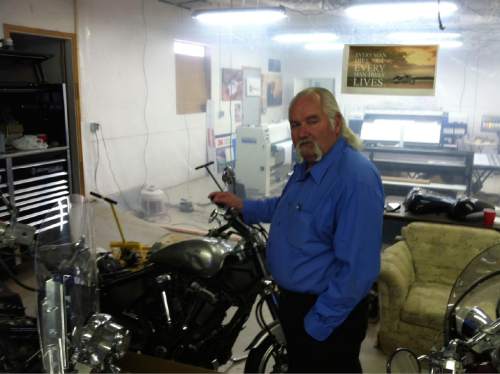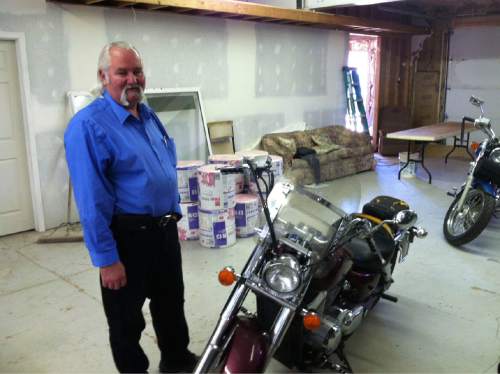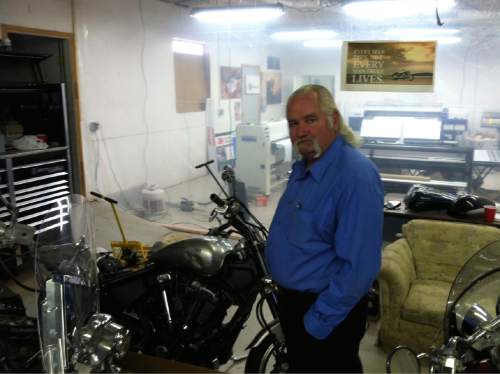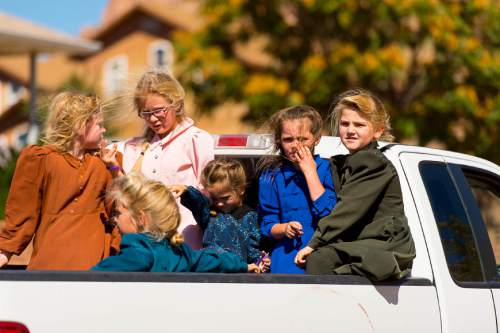This is an archived article that was published on sltrib.com in 2015, and information in the article may be outdated. It is provided only for personal research purposes and may not be reprinted.
Hildale, Utah, and Colorado City, Ariz. • What's the worst thing Helaman Barlow did as a marshal of the polygamous towns here on the Utah-Arizona border?
He knew men who took 16-year-old girls as plural wives. The marriages were sanctioned by the Fundamentalist Church of Jesus Christ of Latter-Day Saints, so Barlow didn't report them.
He looked up license plates for church security so they could track dissenters and their families. He obstructed the FBI when it came to town.
When a church leader said he wanted another marshal demoted, Barlow watched for and reported a minor transgression made by the marshal, so officials of Colorado City and adjacent Hildale had cause for the punishment. Barlow said a similar tactic was used to fire him when he fell out of favor with FLDS leaders.
But the worst thing Barlow did as a marshal? When asked that Wednesday in his workshop in Colorado City, he grimaced behind his white Fu Manchu mustache.
"I better not tell you that," Barlow said.
What ever it is, local and federal prosecutors have not yet given Barlow immunity for it, he explained, though they have given him that clearance for a lot of other things he has confessed in the past year.
Those confessions have affirmed what many in and out of Hildale and Colorado City, collectively known as Short Creek, have believed for decades — that the FLDS run the towns, down to making hiring decisions for the local governments. Barlow, 49, said he tried to walk a line between protecting his faith and providing the same type of policing you would expect to find in any town.
"This community," Barlow said, "has always been a theocracy."
—
"Church calling" • The Barlow family has been integral to Short Creek. Barlow's grandfather was John Y. Barlow, one of the community's founders and, from 1935 until his death in 1949, the prophet of what would become the FLDS.
Barlow's father, Sam Barlow, was a deputy sheriff for Mohave County, Ariz., and later a Short Creek deputy marshal during the 1980s, during which he also acted as a church spokesman.
Helaman Barlow said he has never been a polygamist. He was married and divorced once when he was young. He married his current wife when they were in their early 20s. They have 11 children.
Barlow said he wanted to be a Short Creek marshal. In 1994, when another candidate failed the physical-fitness requirements at Utah's police academy, Colorado City's mayor went to Barlow and asked if he wanted the job. (Prospective Short Creek marshals go to Utah's police academy then gain certification in Utah and Arizona.)
Barlow did. But first, he wanted someone's advice — that of Rulon Jeffs, then the FLDS president and prophet and the father of current FLDS President Warren Jeffs. Barlow called him and asked what God wanted him to do.
Rulon Jeffs told Barlow that, yes, he should attend the police academy; he would do a good job as a marshal. The day Barlow graduated from the academy in June 1994, his father and Rulon Jeffs took him to lunch at Rulon Jeffs' favorite restaurant, the since-defunct New Hong Kong in Sandy.
Barlow asked the prophet what advice he had for a new marshal. Barlow couldn't remember the exact words Wednesday, but said it was along the lines of "stand between the church and all harm."
"It was very well understood in my mind," Barlow explained, "that it was a church calling."
—
Short Creek bridge • For the most part, Barlow said, there were no conflicts between his role as a marshal and that of an FLDS follower. He still enforced laws, though he was more inclined to issue warnings for traffic offenses than to write someone a ticket. When a teenage boy in a passing vehicle mooned Sam Brower, the private detective who has been investigating the FLDS for a decade, Barlow tracked down the youngster and cited him for lewdness.
Barlow said he tried to be a bridge between church leadership and law enforcement. When a warrant was issued for someone in the FLDS hierarchy, usually for some misdemeanor offense or contempt of court, Barlow would go to the leader and explain that the warrant wasn't going away.
Barlow then would drive the man to the Washington County Jail, stop, handcuff him, take him into the lockup, book him and have him pay the fine.
For the last eight years of his career, Barlow investigated crimes against children.
Patricia Sheffield, director of the Washington County Children's Justice Center, said Barlow would bring children there to be interviewed about abuse allegations.
There, Sheffield said, Barlow would try to persuade the kids — who distrusted outsiders — to be honest with the staff.
"He trusted us as staff here," Sheffield said, "that we would be honorable with the children."
Barlow saw a paradigm shift in Short Creek when Warren Jeffs took charge in 2002 and began evading process servers, sheriff's deputies and, eventually, the FBI. By the time Jeffs made the FBI most-wanted list, Barlow tried to distance himself from law enforcement and FLDS higher-ups.
Barlow said he told everybody he didn't want to know where Jeffs was and that no one should tell him. Barlow didn't communicate with Jeffs while he was on the run.
His brethren weren't so careful.
—
"Slow walking" • Two other marshals wrote Jeffs letters professing their loyalty. When law enforcement intercepted the correspondence, Utah and Arizona stripped the pair of police powers.
Four other Short Creek marshals lost their badges or quit during that decade over allegations of bigamy or failing to answer grand jury questions.
Barlow said he and other marshals also received instructions from the church on how to block the FBI and other law enforcement that came to town. If another law enforcement agency arrived in Short Creek to serve a search warrant or subpoena, the marshals would announce it over their radios, knowing every marshal, firefighter and search-and-rescuer would hear it.
One of those people would warn the person about to be served. The marshals' term for this tactic: "slow walking."
Barlow and his colleagues also helped church security, dubbed the "God Squad" by former FLDS members. Security would spot a car entering the towns and ask the marshals to whom the license plates belonged.
"We were one of the tools in their belt," Barlow said.
The God Squad sometimes would reciprocate and tell the marshals about teens drinking alcohol or other crimes.
—
Wanting to leave • In 2008, Texas authorities raided the Yearning for Zion Ranch near Eldorado. Two of Barlow's sisters were there, and Texas Child Protective Services removed their children. Barlow went to Texas to try to help his siblings.
Barlow said he and Willie Jessop, Jeffs' chief protector at the time, learned from their attorneys and Texas Rangers about what was found on the ranch — records of Jeffs taking 12- and 15-year-old girls as brides and having sex with the younger one in the temple.
Barlow knew of FLDS marriages to 16-year-olds. Marshal Rodney Holm was convicted of bigamy in Utah for taking a teenage bride. Barlow, he later testified in a deposition, heard that Marshal Jonathan Roundy had taken a 16-year-old as a wife. Since the church approved the marriages, Barlow didn't investigate or report them.
But 12- and 15-year-old brides? Barlow had never seen anything like that in the FLDS. He decided he wanted out. His wife, Enid, wanted to stay.
So Barlow continued going to church and taking orders from the Jeffs family. He and his wife were admitted into the United Order — Warren Jeffs' elite subset among his followers.
About a year after the Texas raid, Lyle Jeffs, Warren Jeffs' brother, wanted one of his handpicked followers to be a full-time marshal in Short Creek. To facilitate the move, Barlow reported deputy marshal Shem Jessop for misconduct after the latter searched a juvenile's car in a way that violated policy.
"We basically made a mountain out of a mole hill," Barlow said.
Shem Jessop was demoted to part time.
In May 2012, Barlow has said, he was appointed interim chief of the Short Creek marshals. That July, Barlow went to the then-bishop of Short Creek, John Wayman.
Wayman approved of Barlow being appointed permanent chief and said he would let the town governments know, according to a Barlow deposition.
That same month, Lyle Jeffs stood up in church, told the congregants they were unworthy of the United Order, needed to repent and would be interviewed again for inclusion.
This time it was Enid who had enough. Barlow told his wife, "Good." Then he started telling her what he learned in Texas.
Warren Jeffs and his brothers had ordered their followers not to read or watch anything about the Texas findings. That became a conflict for Barlow when he was asked — during a Nov. 21, 2013, deposition for the U.S. Department of Justice discrimination lawsuit against Hildale and Colorado City — to read aloud some of Jeffs' dictations seized by Texas authorities.
Barlow was evasive and downplayed the church's involvement in the towns. Then a Justice Department lawyer showed Barlow some of Warren Jeffs' writings seized by Texas and had Barlow read them aloud. Colorado City Town Manager David Darger, who was at the deposition, left the room when the Jeffs documents appeared.
—
Confessions • Barlow said FLDS and town officials were already suspicious of him and his wife for having stopped attending church. He also had quit answering phone calls from church leaders. Reading the Texas evidence appeared to be the last straw.
Four days after the deposition, Darger accused Barlow of drinking the morning of the deposition and having beer on his breath. Barlow, who denied the allegation, received a written reprimand. More write-ups followed. Darger also was curt with him, Barlow said, and wouldn't travel with him on town business anymore. The towns placed Barlow on administrative leave in early April 2014. He eventually was fired.
Barlow went to the Justice Department. On April 22, 2014, at a motel in St. George, Barlow gave a new deposition, telling the government, among other things, about how the towns and the FLDS operate, alleging that Darger told him to alter a police report to make it less favorable to an FLDS critic and about the retaliation he suffered after the earlier deposition.
In that same deposition, under questioning from Hildale lawyer Blake Hamilton, Barlow admitted to lying in his previous deposition and to failing to investigate or report a number of crimes or policy violations committed by other marshals. The lying and omission was later cited by the towns as cause to terminate Barlow.
Hamilton also has argued, in court documents and in interviews, that employees of Hildale and Colorado City have the right to their religion; that the Justice Department must show specific violations of the law and then must show a pattern that caused injury to people alleging discrimination. The Department of Justice lawsuit against the towns is continuing.
Barlow also has spoken with investigators from the Washington County Attorney's Office and the Arizona attorney general — all under promises of immunity. Washington County Attorney Brock Belnap on Thursday declined to discuss details of his interview with Barlow and said it would be speculation to say whether the new information would lead to any criminal charges.
Barlow said he didn't want to leave policing but surrendered his police certification rather than have Utah and Arizona take it away. He has started a print shop, where he also stores motorcycles for his friends and family. Motorcycles have been a hobby of his since he was old enough to drive.
He grew the Fu Manchu and let his white hair grow to his shoulders to announce his defection from the Jeffses. Loyal FLDS men have short hair and no whiskers.
"I don't have to explain anything," Barlow said of his look.
Like a cop looking for a clue, Barlow watches the reactions people give him in Short Creek. If passers-by see him, put their heads down and walk away, they are still loyal to church leaders.
If they peer at his locks and facial hair and smile, Barlow said, either they, too, have left the FLDS or want to.
ncarlisle@sltrib.com Twitter: @natecarlisle









